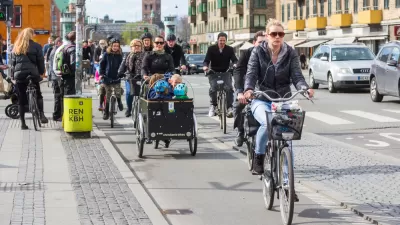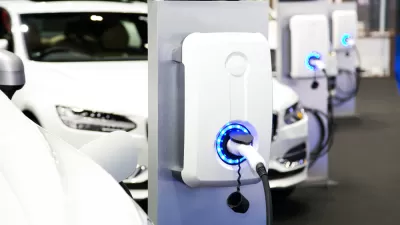Similar to other plans focused on reducing emissions from the transportation plan, North Carolina’s draft Clean Transportation Plan will rely on electric vehicles to reduce emissions from the state’s transportation sector.
The state of North Carolina recently published a draft Clean Transportation Plan as the result of a January 2022 executive order by Governor Roy Cooper. The plan calls for the North Carolina Department of Transportation to create a team dedicated to emission reductions and efforts to promote electric vehicles (EVs), transit, and other forms of mobility that rely less on gas combustion engines.
The Clean Transportation Interagency Task Force proposed by the plan would include representatives from the state’s Commerce, Environmental Quality, and Health and Human Services departments.
According to an article by Richard Stradling, published behind a paywall at the Charlotte Observer but also available at Government Technology, the transportation sector produced 36 percent of the state’s greenhouse gas emissions—a plurality among all other emitters in the state.
Stradling also explains that the plan follows a mandate from the executive order to make a plan that would put 1.25 million zero emission vehicles (ZEVs) on the road in the state by 2030.
“The draft plan covers a range of areas, including finance, NCDOT policies and practices and coordination with utility companies,” writes Stradling, while also pursuing ‘equitable outcomes for everyone.’
The state of North Carolina’s focus on EVs for emissions reductions falls short of the model provided by the state of California, but mimics that plan, along with the federal Inflation Reduction Act, in relying on EVs to reduce emissions from the transportation sector. One of the most prominent debates in transportation planning right now focuses on the question of whether EVs will be enough to prevent the worst effects of climate change, or if the country is missing a once-in-a-generation opportunity to reverse some of the damaging effects of over a century’s worth of car-centric planning.
Stradling’s article can be read in full at the link below.
FULL STORY: North Carolina DOT Outlines Plan for Cutting Emissions

Maui's Vacation Rental Debate Turns Ugly
Verbal attacks, misinformation campaigns and fistfights plague a high-stakes debate to convert thousands of vacation rentals into long-term housing.

Planetizen Federal Action Tracker
A weekly monitor of how Trump’s orders and actions are impacting planners and planning in America.

San Francisco Suspends Traffic Calming Amidst Record Deaths
Citing “a challenging fiscal landscape,” the city will cease the program on the heels of 42 traffic deaths, including 24 pedestrians.

Defunct Pittsburgh Power Plant to Become Residential Tower
A decommissioned steam heat plant will be redeveloped into almost 100 affordable housing units.

Trump Prompts Restructuring of Transportation Research Board in “Unprecedented Overreach”
The TRB has eliminated more than half of its committees including those focused on climate, equity, and cities.

Amtrak Rolls Out New Orleans to Alabama “Mardi Gras” Train
The new service will operate morning and evening departures between Mobile and New Orleans.
Urban Design for Planners 1: Software Tools
This six-course series explores essential urban design concepts using open source software and equips planners with the tools they need to participate fully in the urban design process.
Planning for Universal Design
Learn the tools for implementing Universal Design in planning regulations.
Heyer Gruel & Associates PA
JM Goldson LLC
Custer County Colorado
City of Camden Redevelopment Agency
City of Astoria
Transportation Research & Education Center (TREC) at Portland State University
Jefferson Parish Government
Camden Redevelopment Agency
City of Claremont





























